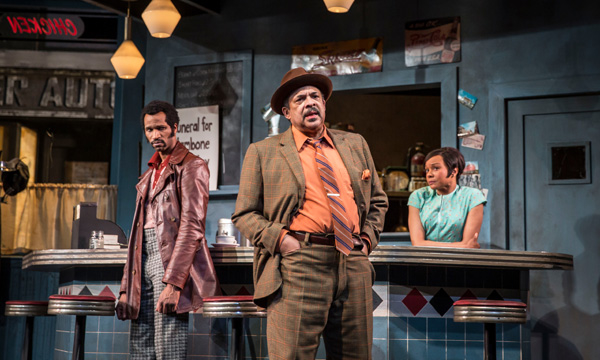
(© Liz Lauren)
There's something Beckettian about Two Trains Running, August Wilson's 1969-set drama of characters yearning for change and stuck in a rut. Didi and Gogo spend Waiting for Godot repeating an existential vaudeville act while waiting for an entity that never shows up. The ensemble of Two Trains Running spends the show raging and ruminating about things they want that are forever just out of reach.
Of the 10 plays in Wilson's Century Cycle (all but one takes place in Pittsburgh, during a different decade of the 20th century), Two Trains Running is the most minimally plotted. Set in a diner, the action isn't quite as sparse as in Godot (which has been famously described as a story wherein nothing happens, twice). Still, Two Trains Running is founded on gorgeously poetic language rather than momentous, thunderclap events. In director Chuck Smith's staging for the Goodman Theatre, every word is a treasure. The dialogue pulls you in like a benevolent riptide and immerses you in something rich, mesmerizing and far deeper, grander, and more powerful than the superficial banter seems to indicate.
The well-worn diner where the drama transpires belongs to Memphis (Terry Bellamy), with the story revolving around whether Memphis will get a fair price for the establishment, which is about to be condemned in the name of urban renewal. There's more talk than food in Memphis' restaurant: His menu is limited to beans, bread, and coffee. The funeral parlor next door, by contrast, is thriving as undertaker West (A.C. Smith) oversees the sendoff of neighborhood evangelist Prophet Samuel. The diner is nearly empty, but the funeral home has mourners lined up around the block waiting to say goodbye.
In Memphis' diner (rendered in cinematic detail by set designer Linda Buchanan), the clientele may be sparser but the humanity is abundant as each character makes an indelible mark. Wiry, fast-talking Wolf (Anthony Irons) runs numbers, hustling bets over a battered pay phone. The mentally challenged Hambone (Ernest Perry Jr.), obsessively demands (as he has for years) that the white town butcher pay him the ham he was promised for painting a fence. Holloway (Alfred H. Wilson) reads the paper, intermittently lacing the conversation with the storytelling wisdom of someone who has endured a world of pain. Waitress Risa (Nambi E. Kelley) pours coffee with a taciturn poker face that seems in utter contrast to the emotions indicated by the thick, self-inflicted scars on her legs. Finally, there's Sterling (Chester Gregory), fresh out of the penitentiary and radiating a patina of confident swagger befitting his name.
For the next few hours, Wilson gives the audience a fly-on-the-wall view of the everyday back-and-forth among these seven people, elevating their dialogue to the level of wrenching drama and stirring poetry. The denizens of the diner are people who — short of their obit — wouldn't rate a mention in the local newspapers, never mind on the grand timeline of history. Yet through them, Wilson throws the cataclysmic events of the civil rights era, and all the oppression surrounding it, into stark relief. He does this without pretention or affectation, and often so subtly that the cumulative impact of a particular character or monologue sneaks up on you. Conversations about things as simple as a pair of gloves or sugar dispenser suddenly delivers an epiphany you never see coming.
Gregory's Sterling is young, brash, and stubborn enough to believe that he can succeed at anything if only he gets a break. Though Hambone only has a single line (repeated many times), he's a revelation. His single-minded shouting is a call for far more than a pound of pork. Irons' Wolf is an electric rail of initiative, a businessman who isn't about to make the lack of legit business opportunities slow him down. Smith is regally commanding as the wealthy, impossibly well-dressed undertaker, a man of whose shrewd cynicism can't squelch his solidarity with the people of the Pittsburgh Hill District. Wilson's Holloway has a gentleness that can't quite mask the potential for anger that lurks within the street philosopher's soul. Listen for Holloway's recounting of why he sought the help of Aunt Ester, the magical, 300-plus-year-old-woman who serves as the neighborhood's spiritual leader. There's more than sage, easygoing benevolence to Holloway.
Nothing more outwardly momentous than a real estate deal takes place over the course of Two Trains Running's nearly three-hour running time. But those three hours flash by like a comet. And, when it's over, the significance of a hundred small, seemingly inconsequential conversations takes on immeasurable depth and breadth.









